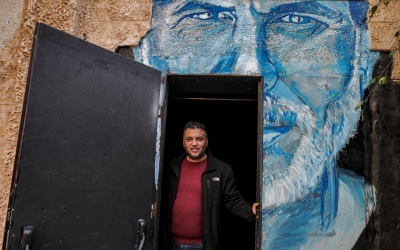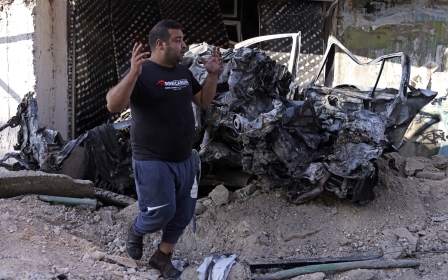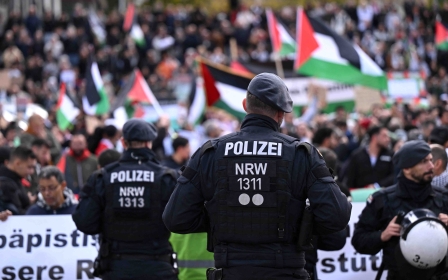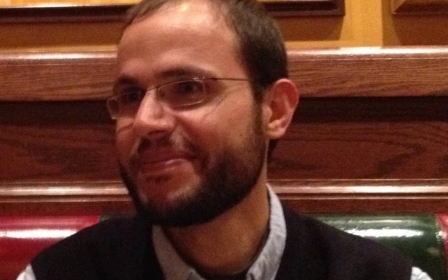Israel-Palestine war: Israeli forces detain and assault Palestinian artists after raid on Jenin theatre
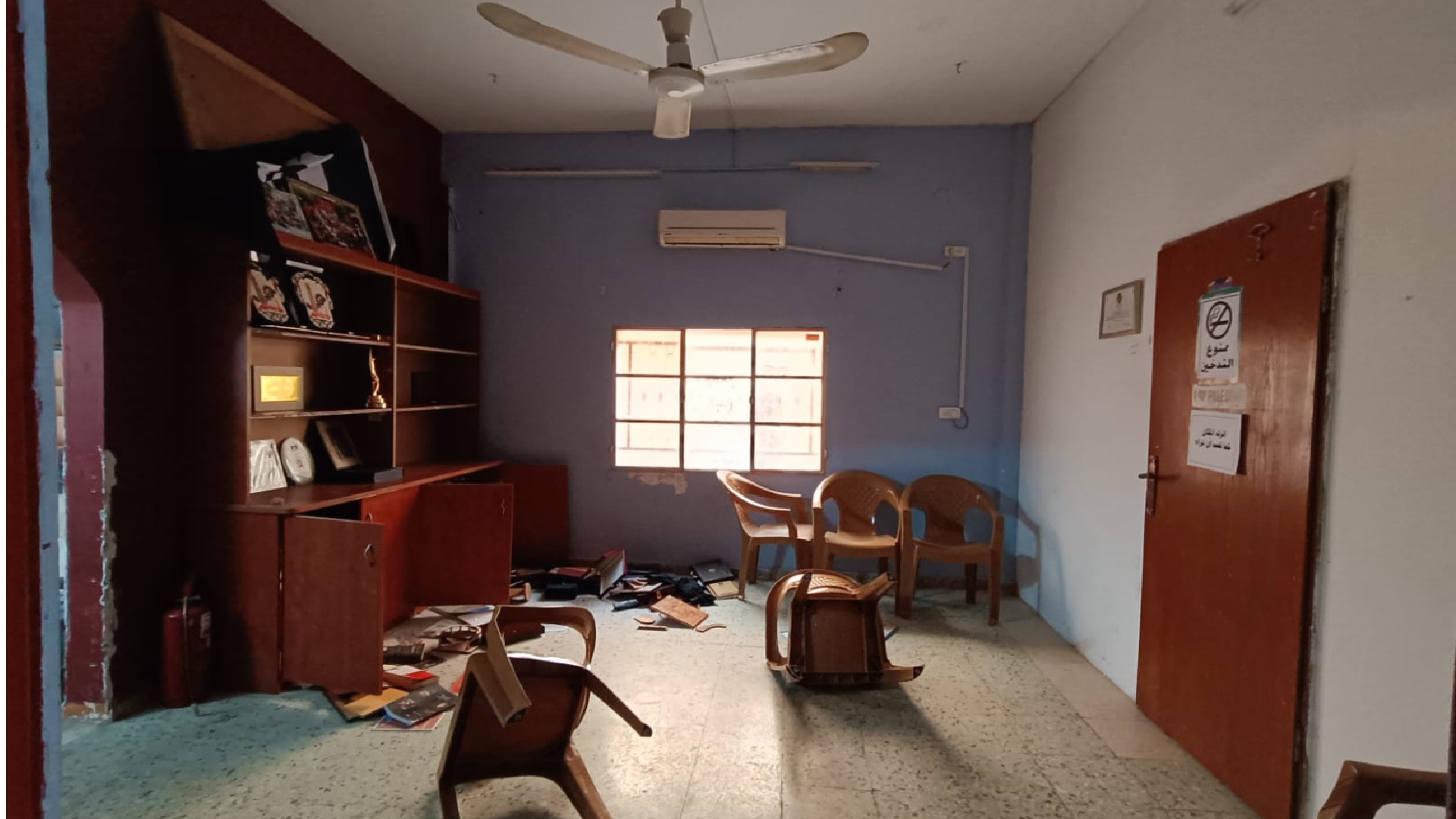
Israeli forces have sparked widespread criticism after raiding the Freedom Theatre, a community theatre based in Jenin refugee camp in the occupied West Bank, detaining three of its artists on Wednesday.
The troops ransacked the theatre, destroying offices, knocking down a wall and began firing from inside the building, in what Zoe Lafferty, the theatre's associate director, decried as a form of "cultural genocide".
Israeli forces then detained the artistic director, Ahmed Tobasi and producer and manager, Mustafa Sheta, at their homes, blindfolding and handcuffing them. The troops later “severely beat” and detained a recently-graduated acting student, Jamal Abu Joas at his home, according to a statement by the theatre.
"The night before, Tobasi was really nervous because they were going house to house and arresting people," Lafferty told MEE.
"He was already putting his coat on in case they came to the house," she added.
New MEE newsletter: Jerusalem Dispatch
Sign up to get the latest insights and analysis on Israel-Palestine, alongside Turkey Unpacked and other MEE newsletters
Tobasi reported that, before detaining him, Israeli forces made him take off his jacket and lie in the street in the rain. They then broke into his home, destroying “everything they could, even taking plants and throwing them on the ground," the theatre statement added.
"They took the new computer we bought to run our shows from," Lafferty said. "It wasn't expensive but it is a huge amount of money for the Freedom Theatre. We needed to use it for the next eight years."
Israeli forces then blindfolded him with a towel, before handcuffing and detaining him along with his brother.
Sheta’s wife, Rasha Sheta, said that her husband was handcuffed in front of their children. “My children spent their night crying. We felt so scared without him being around with us,” she said in a statement.
Follow Middle East Eye's live coverage for the latest on the Israel-Palestine war
Tobasi has subsequently been released, but Sheta and Joas remain detained. The Freedom Theatre said that Tobasi is suffering from leg and back pains as a result of being beaten by Israeli Forces.
"They treated us like animals," he said in a statement following his release. "They are trying to hurt us in any way they can, but it's important we stay strong."
Over 100 Palestinians have been arrested amid the large-scale incursion on the city and the refugee camp. Twelve Palestinians have been killed, including a 17-year-old boy.
A window onto Jenin
Founded after the First Intifada in 1987 as the “Stone Theatre,” the Freedom Theatre aims to provide young Palestinians with important tools for dealing with the hardships of daily life under occupation.
"One of the reasons [it was established] was to find a way to speak to the outside world and tell them what is going on here, and put the perspectives of Palestinians and specifically Palestinians from Jenin onto the stage," Lafferty told MEE.
"The theatre is attacked because it's a cultural organisation that provides a window into what is happening in Jenin camp," Lafferty said. "Also the fact it is located in the camp means it's vulnerable [to attacks]."
In 2011, then artistic director, Juliano Mer-Khamis was shot dead by a masked attacker in Jenin.
In July, the theatre was structurally damaged in an air strike amid a three-day Israeli offensive on Jenin.
Since the latest Israeli onslaught of Gaza began on 7 October, raids and detentions of the theatre and its artists have escalated amid multiple incursions in and around Jenin.
Three of the theatre’s members have been killed by Israeli forces in recent weeks, including 17-year-old Yamen Jarrar, 26-year-old Jehad Naghniyeh, and 30-year-old Mohammed Matahen.
They join youth theatre members, Sadeel Naghnaghia, age 15, who was shot dead by Israeli forces in June, and Mahmoud al-Sadi, age 17, in November 2022.
"They weren't specifically targeted because they're from the Freedom Theatre," Lafferty told MEE. "They were killed just [because] they were from Jenin, [where] all people are targets."
In its statement on Thursday, the theatre highlighted that Israeli forces have long “deliberately targeted” Palestinian cultural institutions and artists, with “unprecedented numbers of writers, poets, theatremakers and journalists” killed since 7 October.
"If you put all of this together, you cannot see it as anything but a very, very strategic and targeted campaign," Lafferty said.
Through the relentless incursions, the theatre has continued its work, enacting its motto of “resistance through art”.
"We have created a generation of artists and leaders, who one day will be at the forefront of the Palestinian liberation movement," the theatre's website explains.
"Freedom is not going anywhere," Lafferty said.
Resisting ‘deep silence’
Theatres and artists internationally have shared solidarity statements with the theatre.
The Royal Court Theatre in London released a statement on X condemning the attack and demanding the “immediate release” of Sheta and Joas.
London's Tamasha Theatre also posted a statement on X demanding the artists’ release and “an end to the persecution of writers, artists - everyone - in Palestine”.
UK South Asian venue Tara Theatre also shared a statement saying, "We stand with Freedom Theatre and call for all creative workers affected by the conflict to be free from persecution."
An open letter signed by over 100 Scottish playwrights demanded "the immediate release of our colleagues, and an end to the military occupation and its targeting of artists, journalists and writers in Palestine.”
'They treated us like animals. They are trying to hurt us in any way they can, but it's important we stay strong'
- Ahmed Tobasi, creative director, Freedom Theatre
Despite a wave of censorship targeting pro-Palestine voices in cultural spaces in the US and Europe, artists and culture workers have been working to amplify the voices of Palestinian artists since the Israeli onslaught on Gaza began on 7 October.
An open letter signed by 1000 artists who refused to work with Bristol’s Arnolfini International Centre for Contemporary Arts after its cancellation of scheduled film and poetry events programmed by Bristol Palestine Film Festival, highlighted “an alarming pattern of censorship and repression within the arts sector”.
On 29 November, hundreds of theatre workers staged a walkout to protest arts organisations' “deep silence” over ongoing Israeli attacks on Palestinians.
On Tuesday, the final poem penned by Palestinian scholar, Refaat Alareer who was killed by Israeli forces on 7 December, If I Must Die, was read by British actor Brian Cox in a video published by the Palestine Festival of Literature.
The poem has been translated into 160 languages and recited at Palestine solidarity vigils and rallies across the world.
Middle East Eye delivers independent and unrivalled coverage and analysis of the Middle East, North Africa and beyond. To learn more about republishing this content and the associated fees, please fill out this form. More about MEE can be found here.


